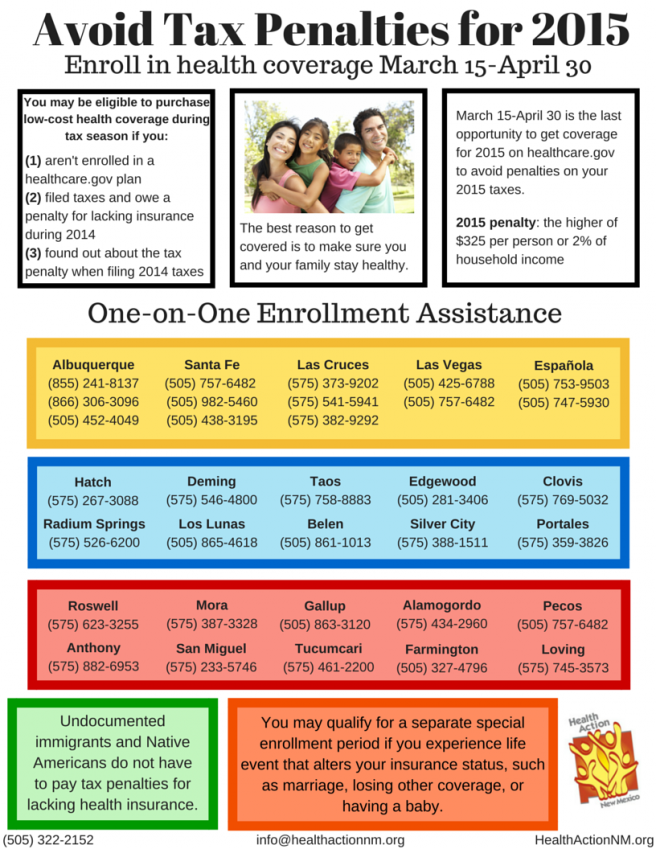Health Action NM has created a bilingual resource for New Mexicans who find that they owe a penalty for lacking insurance for part or all of 2014. From March 15th to April 30th, uninsured families and individuals can sign up for health coverage with financial assistance. The resource provides information about how to connect with in-person assistance to sign up for health coverage and avoid penalties for 2015, which increase to the greater of $325 per person or 2% of household income. See the bottom of this page to view the resource as a JPG or click here for the PDF version.
Who is eligible for the “Tax Season” SEP?
Consumers are eligible for this SEP if they:
- are not currently enrolled in 2015 coverage (whether through New Mexico’s Health Insurance Exchange (NMHIX), an employer, the off-exchange individual marketplace, or other forms of minimum essential coverage),
- attest that they are or will be subject to the fee for not having health coverage for all or part of 2014 when they file their 2014 taxes, and
- attest that they first became aware of, or understood the implications of, the requirement to maintain minimum essential coverage (MEC) after the end of open enrollment (February 15, 2015) in connection with preparing their 2014 taxes.
What does “subject to the fee” mean?
- Eligible consumers must be required to pay the fee for at least part of 2014.
- Consumers do not have to have paid the fee before enrolling through the SEP. In other words, consumers who have not yet filed their 2014 income tax return (including those who have an IRS extension to file their 2014 return) may still be eligible for this SEP so long as they will have to pay the fee when they do actually file their taxes.
Who is not eligible for this SEP?
- Consumers who are exempt from the fee for the entire year in 2014 or who had coverage for the entire year in 2014.
- Consumers who completed their tax filing prior to February 15, 2015 or otherwise became aware that they would be subject to the fee in 2014 before the end of open enrollment.
- Consumers who do not have to pay the penalty but are subject to reconciliation and have to repay Advance Premium Tax Credits received in 2014.
How long does this SEP last?
- This SEP will begin on March 15th and end on April 30th.
- Consumers who qualify must complete the entire enrollment process (that is, including selecting a plan) by 11:59 pm E.S.T. on April 30th.
- Similar to during open enrollment, consumers who enroll in an initial plan during this SEP can switch to a different plan through April 30th. Note, however, that all plan selections and enrollment processes must be completed by 11:59 pm E.S.T. on April 30th.
How will eligible consumers open or unlock this SEP?
- As of March 15th, the online application includes questions about the attestations in the third and fourth eligibility requirements listed above.
- Consumers can also access this SEP through the Call Center.
When will coverage begin?
- Normal coverage effective dates apply. If a consumer enrolls in coverage on or before the 15th of the month, coverage will be effective on the first day of the following month. In order to have coverage begin April 1st, consumers must enroll on March 15th.
- Note that consumers who enroll through this SEP will be subject to the fee for the months they did not have coverage and were not exempt in 2015 when they file their taxes in 2016. For example, if an eligible consumer enrolls on March 15th his coverage will begin April 1st. When he files his 2015 taxes in 2016, he will be subject to the fee for January through March (3 months) unless he qualifies for an exemption.
Are undocumented immigrants or Native Americans subject to the shared responsibility payment if they don’t have health coverage?
Undocumented immigrants and Native Americans do not have to pay any fees or penalties for lacking health coverage. The IRS recently clarified this rule, stating “Individuals who are not U.S. citizens or nationals, and are not lawfully present in the United States, are exempt from the individual shared responsibility provision and do not need to make a payment. For this purpose, an immigrant with Deferred Action for Childhood Arrivals (DACA) status is considered not lawfully present and therefore is exempt. An individual may qualify for this exemption even if he or she has a social security number (SSN).”
If an improper penalty has been charged, tax filers will need to amend their tax return by filling out Form 8965, which can be found at http://www.irs.gov/pub/irs-pdf/f8965.pdf.
ENGLISH VERSION


